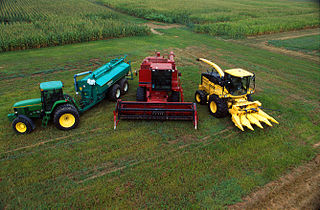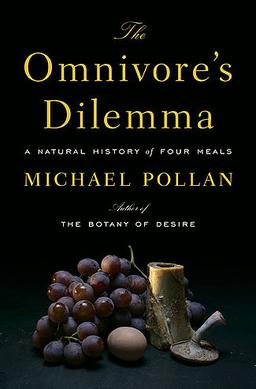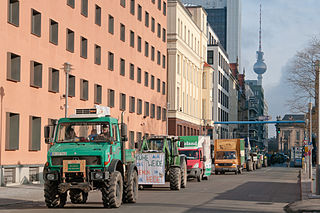Related Research Articles

Intensive pig farming, also known as pig factory farming, is the primary method of pig production, in which grower pigs are housed indoors in group-housing or straw-lined sheds, whilst pregnant sows are housed in gestation crates or pens and give birth in farrowing crates.

Agricultural policy describes a set of laws relating to domestic agriculture and imports of foreign agricultural products. Governments usually implement agricultural policies with the goal of achieving a specific outcome in the domestic agricultural product markets.

An agricultural subsidy is a government incentive paid to agribusinesses, agricultural organizations and farms to supplement their income, manage the supply of agricultural commodities, and influence the cost and supply of such commodities.

Animal husbandry is the branch of agriculture concerned with animals that are raised for meat, fibre, milk, or other products. It includes day-to-day care, selective breeding, and the raising of livestock. Husbandry has a long history, starting with the Neolithic Revolution when animals were first domesticated, from around 13,000 BC onwards, predating farming of the first crops. By the time of early civilisations such as ancient Egypt, cattle, sheep, goats, and pigs were being raised on farms.

Cultured meat is meat produced by culturing animal cells in vitro. It is a form of cellular agriculture.
Compassion in World Farming (CIWF) is a campaigning and lobbying animal welfare organisation. It campaigns against the live export of animals, certain methods of livestock slaughter, and all systems of factory farming. It has received celebrity endorsements and been recognized by BBC Radio 4 for its campaigning. It has grown to a global movement with partners and supporters concerned about the welfare of farm animals.

The meat industry are the people and companies engaged in modern industrialized livestock agriculture for the production, packing, preservation and marketing of meat. In economics, the meat industry is a fusion of primary (agriculture) and secondary (industry) activity and hard to characterize strictly in terms of either one alone. The greater part of the meat industry is the meat packing industry – the segment that handles the slaughtering, processing, packaging, and distribution of animals such as poultry, cattle, pigs, sheep and other livestock.

Conversations regarding the ethics of eating meat are focused on whether or not it is moral to eat non-human animals. Ultimately, this is a debate that has been ongoing for millennia, and it remains one of the most prominent topics in food ethics.

The Omnivore's Dilemma: A Natural History of Four Meals is a nonfiction book written by American author Michael Pollan published in 2006. As omnivores, humans have a variety of food choices. In the book, Pollan investigates the environmental and animal welfare effects of various food choices. He suggests that, prior to modern food preservation and transportation technologies, the dilemmas caused by these options were resolved primarily by cultural influences.

Tristram James Avondale Stuart is an English author and campaigner.

Industrial agriculture is a form of modern farming that refers to the industrialized production of crops and animals and animal products like eggs or milk. The methods of industrial agriculture include innovation in agricultural machinery and farming methods, genetic technology, techniques for achieving economies of scale in production, the creation of new markets for consumption, the application of patent protection to genetic information, and global trade. These methods are widespread in developed nations and increasingly prevalent worldwide. Most of the meat, dairy, eggs, fruits and vegetables available in supermarkets are produced in this way.

Intensive animal farming or industrial livestock production, also known by its opponents as factory farming and macro-farms, is a type of intensive agriculture, specifically an approach to animal husbandry designed to maximize production, while minimizing costs. To achieve this, agribusinesses keep livestock such as cattle, poultry, and fish at high stocking densities, at large scale, and using modern machinery, biotechnology, and global trade. The main products of this industry are meat, milk and eggs for human consumption. There are issues regarding whether intensive animal farming is sustainable in the social long-run given its costs in resources. Analysts also raise issues about its ethics.

A sustainable food system is a type of food system that provides healthy food to people and creates sustainable environmental, economic and social systems that surround food. Sustainable food systems start with the development of sustainable agricultural practices, development of more sustainable food distribution systems, creation of sustainable diets and reduction of food waste throughout the system. Sustainable food systems have been argued to be central to many or all 17 Sustainable Development Goals.

Eating Animals is the third book by the American novelist Jonathan Safran Foer, published in 2009. A New York Times best-seller, Eating Animals provides a dense discussion of what it means to eat animals in an industrialized world. It was written in close collaboration with Farm Forward, a US nonprofit organization promoting veganism and sustainable agriculture.
Philip John Lymbery is the Global CEO of farm animal welfare charity, Compassion in World Farming International, Visiting Professor at the University of Winchester’s Centre for Animal Welfare, President of Eurogroup for Animals, Brussels, founding Board member of the World Federation for Animals and a Leadership Fellow at St George's House, Windsor Castle.

We are fed up! is the theme of a series of demonstrations in Germany against industrial livestock production and for more sustainable farming. The biggest demonstrations take place every year in Berlin since 2011 and attract up to 30,000 people. Around 120 different groups, which represent farmers, companies, and environmental rights and animal rights activists organize and sustain the demonstrations. The protests take place parallel to the Berlin International Green Week.

Farmageddon: The True Cost of Cheap Meat is a 2014 non-fiction book by Philip Lymbery and Isabel Oakeshott. It surveys the effects of industrial livestock production and industrial fish farming around the world. The book is the result of Lymbery's investigations for which he travelled the world over three years. Isabel Oakeshott is the political editor of The Sunday Times, Lymbery is CEO of Compassion in World Farming. The book was published by Bloomsbury.
Isabel Oakeshott is a British political journalist.
A meat tax is a tax levied on meat and/or other animal products to help cover the health and environmental costs that result from using animals for food. Livestock is known to significantly contribute to global warming, and to negatively impact global nitrogen cycles and biodiversity.

Eosta is a multinational enterprise, based in the Netherlands, working in the field of organic food. The company specializes in the import, export and distribution of fresh organic fruits and vegetables. Eosta imports overseas fruits from Africa, South America, Oceania, Asia and North America. In 2017 Eosta's CEO, Volkert Engelsman, was elected Most Influential Sustainability Voice of the Netherlands in the yearly sustainability top-100 list by the newspaper Trouw, who called him "a greengrocer with a radical vision".
References
- ↑ Deborah Gewertz, Frederick Errington, Cheap Meat: Flap Food Nations in the Pacific Islands, University of California Press, 2010. ISBN 0520260937
- ↑ Deutsche Welle, Agriculture – The high cost of cheap meat, January, 11 2013
- ↑ Meat Atlas 2014 – Facts and figures about the animals we eat, chapter: The hidden cost of steak, page 20, download Meat Atlas as pdf
- ↑ The Guardian, Why cheap meat costs the Earth, 4 September 2013
- ↑ Huffington Post / RollingStone, Animal Cruelty Is The Price We Pay For Cheap Meat, 12/10/2013
- ↑ ABC Australia, How much is cheap meat really costing us?, 21 Jun 2013
- ↑ The New York Times, The High Cost of Cheap Meat, June 2 2011
- ↑ Chicago tribune, The costs of cheap meat – Critics of factory farms say we pay a high price for low-cost food, September 24, 2010
- ↑ The Guardian, Farmageddon: The True Cost of Cheap Meat by Philip Lymbery – review, 31 January 2014